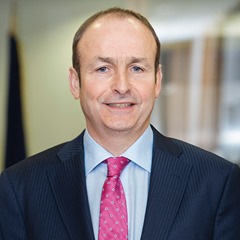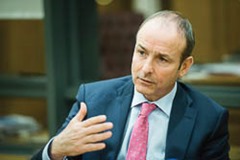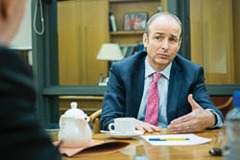Renewing the Republic
 After an electoral rebound, Micheál Martin wants to present a vision for a better society in 2016. Owen McQuade discusses the state of politics and the scope for reform with the Fianna Fáil leader.
After an electoral rebound, Micheál Martin wants to present a vision for a better society in 2016. Owen McQuade discusses the state of politics and the scope for reform with the Fianna Fáil leader.
After a week of street protests and controversy over water charging, Micheál Martin is in a calm and reflective mood as he sums up Fianna Fáil’s current position in Ireland’s political life. Martin finds himself looking across a “very fragmented” political landscape right now not just nationally but also at a European level.
“People have lost jobs, people have lost income, people have lost a degree of hope,” he comments. “People are very insecure in their lives right now in terms of what the future holds for them, for their children, for their young people.”
Economic insecurity feeds into the political framework, as evidenced by Sinn Féin effectively replacing Labour in May’s local government elections.
“We got 25 per cent which, relative to our 2011 general election meltdown, was a good performance,” he adds. “We got the most votes and the most seats of any political party and I think very few people in advance of the local elections would have predicted that.” The mismatch between the results and the polls is the “cautionary tale” about why campaigns matter. Amidst that volatility, it remains to be seen whether the centre of politics “firms up between now and the next general election or whether there will be a further leakage and a further fragmentation.”
A deeper change is perhaps happening, it is put to him, with perhaps half of the electorate opting for independents or Sinn Féin. Martin responds by describing an unprecedented ‘four block’ political system: Fine Gael, Fianna Fáil, Sinn Féin and the independents each with bases of 20 per cent or more – and Labour sitting on 7-8 per cent.
The two-and-a-half party system “ended in 2011”. He adds: “2011 was a watershed election, in political terms, of the hit we took which has challenged our capacity in terms of renewal and again comeback. By definition, when you’ve no TD in Dublin and when you’re at such low levels in the Oireachtas representation, it creates challenges but I think we’ve risen to those.” Fianna Fáil has recognised the very clear message from the voters and “it’s going to take time to renew and revive the party and make it a relevant force in Irish politics.”
Local election success brought a new generation into politics, helped to grow the party’s number of female representatives, and gave it a stronger platform for contesting the next general election. “It makes us more competitive in quite a number of constituencies given the type of candidates that have come through,” Martin says, namechecking Lisa Chambers in Castlebar, Averil Power, and new Dublin councillors David McGuinness and Deirdre Heeney among others.
“It’s a more competitive party as a result of the local elections,” he affirms, “That’s not in every constituency in Dublin but certainly in a number of constituencies.”
As the next election is about forming the next Government, Martin expects the result to differ from the current polls. Manifestos will also influence voters’ choices and, as a precursor, he contrasts Fine Gael’s tax cuts for high earners with how Fianna Fáil’s Budget document aspired for a better society.
“It could be the ‘I see your tax cut with my tax cut’ type of election,” Martin predicts, “or it could be an election where some parties like our own say: ‘Hang on, we’re standing back a bit and saying: ‘What kind of country do we want to live in?’”
Water charges
The public reaction to water charges came as no surprise to him and exemplifies the “significant disconnect between the Government and the people.” As with the medical card u-turn, ministers had fallen for their own spin.
“It wasn’t for the want of warning,” he says of the latter issue. “I mean I was raising it in the Dáil for 18 months. I was raising individual cases with people with life-limiting long-term conditions and there was no-one listening. It dawned on them during the local elections that this was a live issue on the doors.”
Likewise, the property tax disadvantaged low earners in parts of Dublin, Cork and Wicklow. “There has to be some recognition of the ability to pay,” Martin contends. “If you’re a pensioner or a widow and you happen to be in a house in D3 or D4, you’re being hit for six and no-one’s looking at what income is going into your house.”
The water tax became “the straw that broke the camel’s back” again with no provision for ability to pay plus the bonuses, the consultancy bill and “about 12 u-turns.” Families with two young adults aged over 18 – maybe going to college or unemployed – were agitated by the prospect of €500-plus bills.
Martin contends that Eoghan Harris was right to describe water charges as the Government’s Waterloo some six months ago: “I always had a sense that this was going to go awry because I don’t think the Government appreciated how much this was the last straw for people – that they can’t cope with much more.”
Going back on the doorsteps over the last 18 months gave the party a greater insight into the public mood but councillors were initially reluctant to canvass. Martin tried to convince them that it wasn’t too bad.
“People are still giving out to us and that’s fair enough,” he comments, “but what I found most interesting on the doorstep is that people are very focused on the future: ‘Is there a future? What is the future for my family?’”
Some of the more saddening stories were of grandparents worrying about their sons and grandsons. Those in the middle generation appeared to be “set up in life” with a house, job and family but are now in negative equity with one or other parent unemployed and worried about whether their son will get to college. Martin notes: “People are far more pragmatic than we give them credit for and they’re less into the politics of it, more into: ‘We want credible solutions to the problems we’re facing.’”
The anecdote brings the conversation round to Fianna Fáil’s offer to the electorate at the next election.
“Fundamentally,” he says, “it will be around the kind of society we want to create, we want people to live in.” Since its inception, Martin contends that the party has always performed well on education policy and equality of opportunity “irrespective of where that child is born”.
A former teacher, he comments: “Part of our vision embraces education at all levels as a great equaliser in society and also the development of the individual as well as collectively for society itself.”
Access to healthcare is linked to that issue and should be based primarily on medical need. Having established the Health Service Executive, Martin defends it as a good concept despite the difficulties around implementation. He’s keen to remind ministers that they “have not got rid of the HSE, can’t get rid of the HSE” and was dismayed by James Reilly’s dismissal of the board with “no replacement in mind.”
The health system was previously run by 58 agencies with no-one in overall control. Recruitment decisions on consultants were passed between three or four public bodies and “you had all this parish fighting” for major acute services such as cardiology, neonatal care and oncology. Martin links the formation of a national health organisation and improved outcomes for cardiovascular health and cancer care.
However, a lack of administrative capacity undermined the execution of the idea. Brendan Drumm was “excellent on the clinical side of it” but another leader with expertise in administration should have been appointed to deal with the merger of the health boards, and the general streamlining and simplifying of the organisation.
Martin is keen to praise the work of HSE professionals and points to the “dramatic increase in inpatient activity” enabled by better productivity. Opposition parties tend to demonise government achievements “to make things so much worse than they were in order to gain credit” and Fianna Fáil has sought to be “a bit more constructive”.
Political reform
The failure to reform politics stands out as “one of the great disappointments post-2011”. Martin acknowledges the near-absence of Dáil debates on banking in the 10 years up to the economic crash, only appearing on the agenda when the Financial Services Regulatory Authority was established.
“There was a lack of accountability,” he remarks. “By the way, we still lack that accountability in terms of the banking system being accountable to the legislator in some shape or form or the regulator being accountable.”
One of the problems was making the Central Bank independent of government – still a position that is “regarded as something sacred” – and the key question is: “Who guards the guards?” Martin looks back at how the question was asked in financial crises over the last century, including the Wall Street crash. Fianna Fáil wants to set up a powerful Oireachtas committee that would hold regulators to account for their actions.
The core political problem, though, is the executive’s control over the legislature hence his call for a secret ballot for An Ceann Comhairle. This would ensure that, irrespective of the incumbent’s politics, the office would not be seen as “the prize to be given by the Taoiseach of the day and the Government of the day”.
Secondly, the Oireachtas should set its own schedule. The public may not be aware that each day’s Dáil business is announced by the Taoiseach and voted through by government deputies. An independent budgetary office would assess any proposals by deputies which could incur a financial cost and also give a “transparent examination” of the Government’s fiscal proposals. The Congressional Budget Office provides a similar service on Capitol Hill.
 Fianna Fáil also wants future taoisigh to be free to appoint ministers from life outside elected politics. In the past, An Taoiseach has nominated senators with a view to joining the Cabinet i.e. Jim Dooge as Minister for Foreign Affairs (1981-1982) and Seán Moylan as Minister for Agriculture (1957). Martin sees a need for a Minister for Trade who can constantly focus on meeting their targets in Asia and the BRICs without having to fly home for constituency or Dáil business.
Fianna Fáil also wants future taoisigh to be free to appoint ministers from life outside elected politics. In the past, An Taoiseach has nominated senators with a view to joining the Cabinet i.e. Jim Dooge as Minister for Foreign Affairs (1981-1982) and Seán Moylan as Minister for Agriculture (1957). Martin sees a need for a Minister for Trade who can constantly focus on meeting their targets in Asia and the BRICs without having to fly home for constituency or Dáil business.
Two or three appointees could sit in the Cabinet if elected representatives lacked the relevant expertise. Martin explains: “If you take the technology revolution over the last 25 years, I would argue that politically and in the Public Service, the capacities do not exist to fully translate that revolution into government quickly enough. There are times in a world of rapid change that expertise simply isn’t there and you do need outside thinking as well.”
He also laments the “vindictive” whips system. The modern voter does not expect their political representatives “to be sheep all of the time”. The governing parties have lost members through a “we’re going to get them” attitude and have put out the message that a dissenting TD or senator will lose not only the whip but their committee seat and the chance to stand again for the party.
Once a parliamentarian is appointed to a committee, he maintains that their removal should not be within the gift of government. Fianna Fáil removed the whip but allowed people to reapply within six months with the party having the discretion to accept them again. His overall aim is to establish the Oireachtas “as a separate pillar in the balance of power” with a much stronger relationship with government: “Then I think that would mean it would earn more respect from the people in terms of how we do our politics.”
A real Republic
Republicanism has in recent times become associated with Sinn Féin and the Troubles yet the concept has remained at the centre of Martin’s politics since his university days. Education corresponds with republicanism in his mind.
“I can recall when my first child was born, being in the nursery next to the bedroom in the neonatal hospital,” Martin reflects. “They had babies in the cot at night and it was 12 different cots. And a nun said to me: ‘I think I can tell you where each of those children is going to end up.’ I was annoyed about that. Personally, we should never say that if we have a truly republican society and that’s the challenge.”
In a nutshell, true republicanism for him means that no child is left behind regardless of their social upbringing or special needs. He is proud to have introduced special needs assistants as Minister for Education in 1998 but, by his own admission, angered that those children can still face long delays for an assessment. Other aspects include support for same-sex marriage, social justice for the economically disadvantaged, and a united Ireland “by consent and by evolution.”
Martin also sees civil liberties as a republican essential: “The importance and the primacy of freedom of speech and of the individual is central to republicanism and I think that’s under threat.” He would not tolerate intimidating protests where organisations seek to restrict the right of people to participate.
“I can recall myself and Billy Kelleher participating in a home help protest – to which we were invited by the unions – all TDs were,” he notes. “And Sinn Féin personnel tried to intimidate us, tried to abuse us on our own streets of Cork. A few expletives were thrown at us and I remember Billy Kelleher remonstrating and telling them in no uncertain terms that nobody would be telling him what street he could walk on in Cork.”
Sinn Féin’s leadership disavows intimidation but the activities of some supporters “tell a different tale and I think they need to cut that out.” He cites the fierce online criticism of Mairia Cahill.
Martin qualifies his comments by saying: “Not all people in Sinn Féin are doing that. I don’t want to tar everybody with the same brush but there’s an element of that going on.”
On another occasion, Anti-Austerity Alliance protesters followed Martin and TD Timmy Dooley “for about a quarter of a mile, roaring and chanting and all this kind of stuff, videoing every move, hoping that you’d react and they can have a bit of controversy.”
That attitude is “bordering on fascism” and is the antithesis of republicanism: “I respect their right to have views but allow somebody else the right to have their view as well.”
A new North/South vision
Cross-border co-operation has been forgotten by the Government but can deliver practical benefits across the island, according to Martin. Sinn Féin, in his view, has never been a strong supporter of North/South links, perhaps as they fall short of unity or recognise the existence of two jurisdictions.
Martin is satisfied that cross-border bodies have done “some great work” and highlights how InterTradeIreland facilitated an increased number of meetings between northern and southern businesspeople. As Minister for Enterprise, Trade and Employment, he ensured that northern representatives were invited to join all Enterprise Ireland trade missions.
“The enthusiasm has waned,” he says. “Why isn’t there an all-Ireland Enterprise Ireland? There’s no reason why there shouldn’t be.” Such an organisation would mentor entrepreneurs, share best practice and ideas, and pool resources for overseas work. He accepts a potential tension between it and Invest NI, which currently delivers on local enterprise policy in the North, but sees this as “one common agenda and that’s just an example of the kind of thing we could be doing.”






